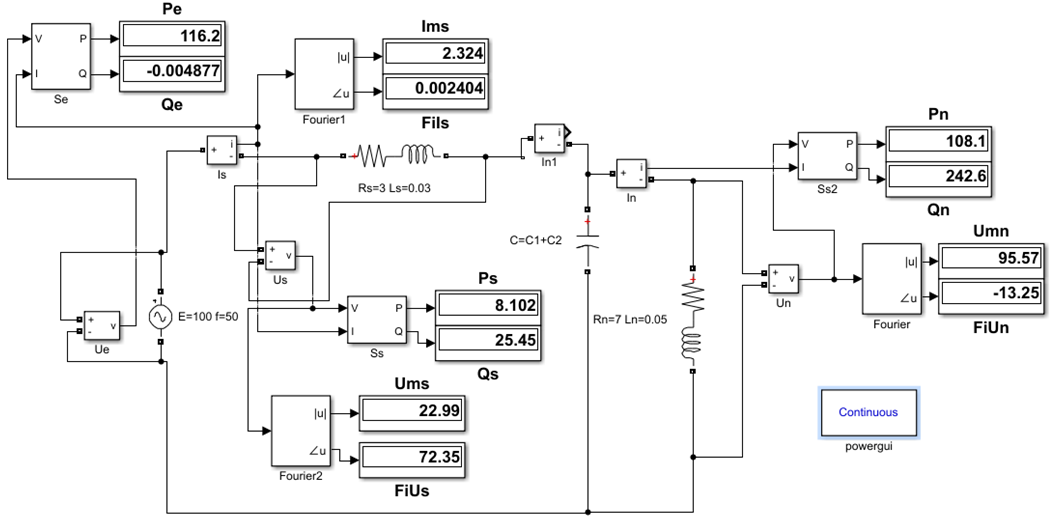Analytical method of determining conditions for full compensation of reactive power in the power supply system
DOI:
https://doi.org/10.20998/2074-272X.2024.2.11Keywords:
electrical system, reactive power, full compensation, search optimization, power factor, equivalent transformations, substitute circuitAbstract
Goal. The purpose of the article is the development of an analytical method for determining the conditions for achieving full compensation in the generalized power supply system based on the use of substitute circuits, which are obtained using equivalent transformations of the topology of the original circuit. Methodology. The article proposes a methodology for replacing series reactive power compensation in high-voltage paths of the power supply system with parallel reactive power compensation in a low-voltage load node. Results. An algorithm for successive transformations of the power supply circuit has been developed, which makes it possible to estimate the values of the capacitances of compensating capacitors, at which full compensation of reactive power in the system is achieved. Originality. The proposed analytical method for calculating the parameters of the compensation unit makes it possible to dispense with complex optimization computer methods and makes it possible to estimate the compensation capacities that fall on the share of the load and the network. Practical value. The proposed technique allows, using a simple algorithm, to determine with high accuracy the necessary parameters of the compensating device, which provide the optimal mode in the power supply system. The proposed algorithm can easily be implemented in a microcontroller system for automatic control of the modes of the power supply system.
References
Kyrylenko O., Zharkin A., Butkevych O., Blinov I., Zaitsev I., Zaporozhets A. Power Systems Research and Operation. Studies in Systems, Decision and Control, 2022, vol. 388. 174 p. doi: https://doi.org/10.1007/978-3-030-82926-1.
Kundur P. Power system stability and control. McGraw-Hill Inc., 1994. 1176 p.
Wang H., Li Q., Wang S., Song D., Jia Y., Peng X., Deng X., Huang Y. Modeling and Control Strategy of Reactive Power Coordination in the Combined System of New Energy Plant and Energy Storage Station. 2023 9th International Conference on Electrical Engineering, Control and Robotics (EECR), 2023, pp. 235-239. doi: https://doi.org/10.1109/EECR56827.2023.10149982.
Wang A., Zhang J. A novel reactive power control strategy in virtual flux droop control. 2017 18th International Symposium on Electromagnetic Fields in Mechatronics, Electrical and Electronic Engineering (ISEF) Book of Abstracts, 2017, pp. 1-2. doi: https://doi.org/10.1109/ISEF.2017.8090711.
Qu S., Zhaohui Q., Zhaowei L., MingMing S., Yuchen H., Zhenhua L. Energy Storage Active and Reactive Power Coordinated Control Considering DC Commutation Failue Voltage Recovery and Restraining AC Line Active Power Fluctuation. 2022 7th Asia Conference on Power and Electrical Engineering (ACPEE), 2022, pp. 1163-1168. doi: https://doi.org/10.1109/ACPEE53904.2022.9783988.
Miller J.E. Reactive power controlled in electric systems. John Willey & Sons, 1982. 416 p.
Yaoyun L. Research on Voltage and Reactive Power Control Strategy Based on Intelligent Detection of Abnormal Data and Coordinated Control of Dynamic Reactive Power. 2022 IEEE 5th International Conference on Automation, Electronics and Electrical Engineering (AUTEEE), 2022, pp. 71-76. doi: https://doi.org/10.1109/AUTEEE56487.2022.9994561.
Srinivasan G., Mahesh Kumar Reddy V., Venkatesh P., Parimalasundar E. Reactive power optimization in distribution systems considering load levels for economic benefit maximization. Electrical Engineering & Electromechanics, 2023, no. 3, pp. 83-89. doi: https://doi.org/10.20998/2074-272X.2023.3.12.
Kobayashi H., Hatta H. Reactive power control method between DG using ICT for proper voltage control of utility distribution system. 2011 IEEE Power and Energy Society General Meeting, 2011, pp. 1-6. doi: https://doi.org/10.1109/PES.2011.6039569.
Yang K., Gong Y., Zhang P., Liu Z. A reactive power compensation method based on tracing the power flow and loss function of power system. 2015 5th International Conference on Electric Utility Deregulation and Restructuring and Power Technologies (DRPT), 2015, pp. 615-619. doi: https://doi.org/10.1109/DRPT.2015.7432309.
European Smart Grids Technology Platform: Vision and Strategy for Europe’s Electricity Networks of the Future. European Commission, 2006. 44 p.
Miron A., Cziker A.C., Ungureanu S., Beleiu H.G., Darab C.P. Reactive Power Compensation at Industrial Consumers: Romanian Study Case. 2022 International Conference and Exposition on Electrical And Power Engineering (EPE), 2022, pp. 101-106. doi: https://doi.org/10.1109/EPE56121.2022.9959800.
Yagup V.G., Yagup K.V. Calculating the parameters of symmetry-compensating device for three-phase electrical power system based on the system decomposition. Technical Electrodynamics, 2016, no. 6, pp. 20-26. (Rus). doi: https://doi.org/10.15407/techned2016.06.020.
Yagup V.G., Yagup K.V. Power compensation modes research in generalized electrical supply system. Technical Electrodynamics, 2022, no. 6, pp. 63-71. (Ukr). doi: https://doi.org/10.15407/techned2022.06.063.
Yagup V.G., Yagup E.V. Research of the modes of full compensation of reactive power in a three-phase power supply system. Electrical Engineering & Electromechanics, 2019, no. 2, pp. 61-65. doi: https://doi.org/10.20998/2074-272X.2019.2.09.

Downloads
Published
How to Cite
Issue
Section
License
Copyright (c) 2024 V. G. Yagup, K. V. Yagup

This work is licensed under a Creative Commons Attribution-NonCommercial 4.0 International License.
Authors who publish with this journal agree to the following terms:
1. Authors retain copyright and grant the journal right of first publication with the work simultaneously licensed under a Creative Commons Attribution License that allows others to share the work with an acknowledgement of the work's authorship and initial publication in this journal.
2. Authors are able to enter into separate, additional contractual arrangements for the non-exclusive distribution of the journal's published version of the work (e.g., post it to an institutional repository or publish it in a book), with an acknowledgement of its initial publication in this journal.
3. Authors are permitted and encouraged to post their work online (e.g., in institutional repositories or on their website) prior to and during the submission process, as it can lead to productive exchanges, as well as earlier and greater citation of published work.




